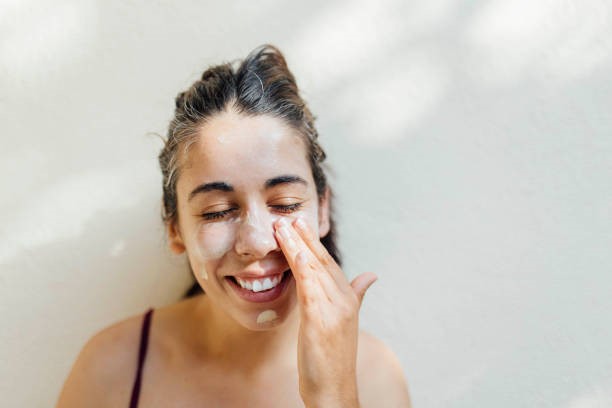11 Common Mistakes to Avoid When Using Sensitive Skin Cream

Sensitive skin cream
Having sensitive skin can be a real challenge, especially with its tendency to react to even the mildest products. As a result, choosing the right skincare products becomes essential, and one of the most commonly used remedies for sensitive skin is to use a cream that caters to your skin type. However, using these creams requires a careful approach to ensure they don’t worsen the issues they aim to address.
Let’s explore common mistakes to avoid when using sensitive skin cream, shedding light on how to nurture your delicate skin effectively.
1. Skipping Patch Tests
The fundamental mistake when introducing new skincare products, especially sensitive skin creams, is skipping the patch test. Even if a product is labeled as suitable for sensitive skin, individual reactions can vary. Always perform a patch test on a small skin area to avoid potential disasters and check for responses before applying the cream to your face or body.
2. Overusing or Misusing the Cream
More isn’t always better, and this is especially true for sensitive skin. Too much of the product can overwhelm your skin and lead to irritation. Follow the recommended usage guidelines provided by the manufacturer. Additionally, be mindful of the application technique – gentle, circular motions are preferable over harsh rubbing.
3. Ignoring Ingredient Lists
Unfortunately, many users overlook this critical step. Ingredients like fragrances, alcohol, and certain preservatives can trigger sensitivity. Go for creams with minimal ingredients, preferably natural and hypoallergenic components. If you need clarification on a particular ingredient, consult with a dermatologist.
4. Mixing Multiple Products
Combining various skincare products might seem like a good idea, but it can be a recipe for disaster, especially for sensitive skin. Different formulations may interact negatively, causing irritation or allergic reactions. Stick to a simple routine with a limited number of products, ensuring they complement each other rather than clash.
5. Neglecting Sun Protection
Sunscreen is a non-negotiable part of any skincare routine, particularly for sensitive skin. Some sensitive skin creams may make your skin more vulnerable to UV damage, so using a broad-spectrum sunscreen with a high SPF is essential. Apply it daily, even on cloudy days, to shield your sensitive skin from the harmful effects of the sun.

6. Not Consulting a Dermatologist
Self-diagnosis and treatment are risky, especially when dealing with sensitive skin. Consult a dermatologist if you need clarification on a suitable sensitive skin cream. They can provide personalized recommendations based on your skin type, concerns, and underlying conditions.
7. Assuming All “Natural” Products Are Safe
While natural ingredients can be gentler on the skin, not all natural products are suitable for sensitive skin. Poison ivy is wild, but that doesn’t mean it’s good for your skin. Similarly, some plant extracts or essential oils can trigger allergies or irritation. Research and choose wisely, and always patch-test new products, whether labeled as “natural” or not.
8. Persisting Despite Irritation
If a sensitive skin cream causes redness, itching, or any form of discomfort, don’t persist in using it, hoping your skin will adjust. Sensitivity indicates that the product isn’t a good fit for your skin. Discontinue use immediately and seek an alternative. Prolonged use of irritating products can lead to more severe issues, including dermatitis.
9. Using Hot Water During Cleansing
Sensitive skin reacts poorly to extremes; hot water can strip away its natural oils, making it more vulnerable. When cleansing, use lukewarm water instead. This gentle approach helps maintain your skin’s natural balance and prepares it for applying sensitive skin cream without causing unnecessary stress.
10. Forgetting Internal Factors
Skincare isn’t just about external products; your internal health plays a significant role. Factors like diet, hydration, and stress levels can impact the health of your skin. Ensure you drink enough water, eat a balanced diet rich in nutrients, and manage stress through relaxation techniques. A proper approach to skincare can complement the use of sensitive skin cream and improve overall skin health.
11. Forgetting to Check Expiry Dates
Skincare products, including sensitive skin creams, have a shelf life. Using expired products can lead to reduced efficacy and potential skin issues. Always check the expiry date before purchasing a new product, and periodically review the items in your skincare collection to ensure they’re still within their usable timeframe.

Conclusion
Caring for sensitive skin requires diligence, patience, and a well-informed approach. By avoiding these common mistakes and taking a careful, individualized approach to skincare, you can nurture your sensitive skin effectively.
Remember to patch test, read labels, consult professionals, and prioritize sun protection to create a tailor-made skincare routine. Get the best sensitive skin cream now at Caprine Cosmetics!
